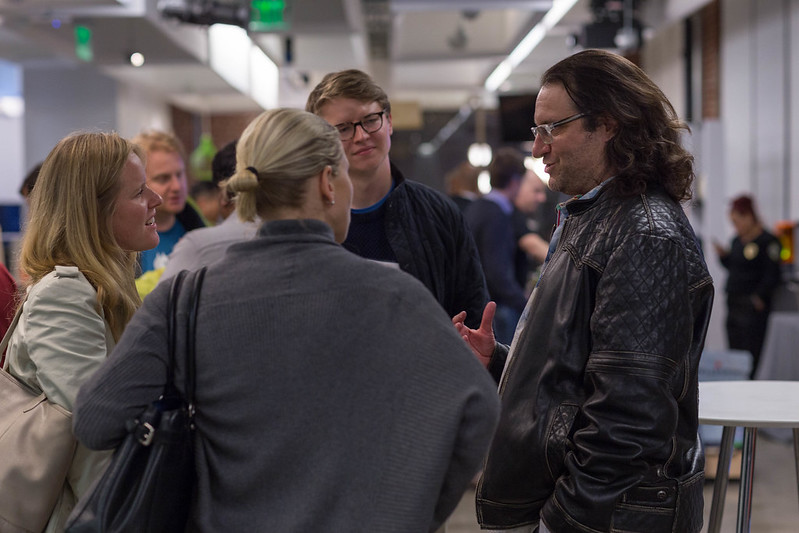Editor’s note: Get this free weekly recap of TechCrunch news that any startup can use by email every Saturday morning (7am PT). Subscribe here.
We’re pleased to kick off this week’s newsletter by sharing an important new project: The TechCrunch List. It’s a database of investors who have shown a commitment to first checks and leading rounds from seed through growth, based on founder recommendations we’ve received as well as learnings from our own research.
Our goal is to quickly help founders talk to the investors who are serious about writing them checks when they need it most. You can filter by industry vertical, round size and location to find the best people for you. Today you’ll see 391 investors based on more than 1,200 recommendations across 23 main verticals. Since launch on Tuesday, we’ve received another 600 recommendations and counting fast, so we’ll be providing another big update next week.
My colleague Danny Crichton, who leads the project, has written up an FAQ for people who want to know more about the methodology, or how they might submit a recommendation. For Extra Crunch subscribers, he also put together a list of the 11 investors who have had the most positive recommendations, and an explainer about why certain investors earn great ‘founder NPS’ scores.
Now stop reading this for a minute and check it out.

Image Credits: Dani Padgett / StrictlyVC
Brad Feld on how to influence your odds of success
Connie Loizos caught up with long-time VC Brad Feld of Foundry Group, who has a new book out about startup ecosystems. Some of it is theoretical, as you can read about in the full interview, but Feld connects his points to more tactical advice. Here’s a great example:
TC: Your new book talks about complex systems. How do founders balance the need to manage these complex systems with the fact that controlling these complex systems is sometimes out of their hands?
BF: The first step is getting rid of the notion that you can control the systems, and instead focus on what you can influence [because] in the context of what you can influence, that starts to become a place to focus where you put your energy.
An example of this would be in the current moment. If you have existing investors, and if you have not asked your existing investors directly how much money they have reserved for you for future financings and what you need to do to get that money from them, you’re not focusing on what you can influence.
The worst thing your investor can do is say, ‘I’m not going to tell you that.’ But if your investor is really on your side and wants to see you be successful, it’s likely your investor will say, ‘All right, well, you know . . .’ There might be some wishy-washy [talk] and [dollar] ranges and non-committal language, but you’ll at least have a frame of reference whether that’s zero dollars, a little bit of money, or a lot of money. And you can start to understand, ‘Well, what do we need to do given this moment?’

Edtech goes back to school
Natasha Mascarenhas surveyed eight leading edtech investors for Extra Crunch about the latest changes happening in the space, especially as its importance has grown during the pandemic. “Investors differed on which subcategories benefitted the most,” she writes, “but it’s clear that the pandemic didn’t lift up the entirety of the edtech space. One investor noted that the pandemic made them even less interested in ISAs, while other venture capitalists noted how valuable the financing instrument is now, more than ever before.” She also took a look at a flurry of acquisitions happening globally in the vertical.

(Photo by Pat Greenhouse/The Boston Globe via Getty Images)
A pledge to support international students
The Trump administration backed down from forcing international students to leave the country if their courses went online-only this week, shortly after being sued by some leading universities and 17 state attorneys general. Following the push against most worker visas and other anti-immigration measures, everyone affected expects more problems. To that end, resident TechCrunch immigration legal expert Sophie Alcorn cofounded a new effort to support international students. Here’s more detail:
We proudly announce the Community for Global Innovation (CFGI), a movement centralizing how companies and individuals around the world can stand in solidarity with international students and the belief that everybody deserves a chance to succeed. CFGI is a constellation of top startups, VCs, professionals, nonprofits, international students and grads. We pledge to support international students, create awareness and effect change.
Through the platform, companies take the CFGI Pledge to support international students: ‘If you’re international, no problem. In our team, everybody has a chance.’ We also teamed up with Welcoming America, a leading U.S. nonprofit, accepting donations to make the U.S. more inclusive toward immigrants and all residents. We’re actively seeking the support of volunteers, corporate donors and community members such as international startup founders who know it’s time to share their stories.

An immersive chat future
Podcasting, social audio and virtual reality are combining into a potentially new trend, Lucas Matney writes for Extra Crunch this week. “As audio-centric platforms garner investor interest, virtual reality founders of old are trying to push 3D audio as the next evolution, presenting the tech in a way that looks entirely different from today’s voice chat platforms. Though some of these efforts have been in the works for a while, the fledgling platforms are a lot more interesting, as social efforts like Clubhouse take flight and investors continue to eat up audio startups.” Top early examples so far include High Fidelity and Teooh.
Around TechCrunch
Ready, set, network! CrunchMatch is now open for Early Stage 2020
Everything you could possibly want to learn about fundraising will be covered at TC Early Stage
Marketing, PR and brand building, oh my! TechCrunch Early Stage goes down July 21 and 22
Here’s your chance to meet with Sequoia’s partners at TC Early Stage
Sign up for next week’s Pitchers & Pitches competition on 7/23
TechCrunch talks virtual events and event technology
Learn how to build a company that puts profits and users first, and VCs last, at Disrupt 2020
Bumble founder Whitney Wolfe Herd is coming to Disrupt 2020
Emily Heyward will teach you how to make your brand awesome at TC Early Stage
Across the week
TechCrunch
US beat China on App Store downloads for first time since 2014, due to coronavirus impact
China Roundup: Tech giants take stance on Beijing’s data control in Hong Kong
Legal clouds gather over US cloud services, after CJEU ruling
India smartphone shipments slashed in half in Q2 2020
Extra Crunch
Extension rounds help some startups play offense during COVID-19
How Thor Fridriksson’s ‘Trivia Royale’ earned 2.5M downloads in 3 weeks
Investors are browsing for Chromium startups
As companies accelerate their digital transitions, employees detail a changed workplace
An unsurprising wave of video-focused startups is trying to make video calls better
#EquityPod
From Alex Wilhelm:
Hello and welcome back to Equity, TechCrunch’s venture capital-focused podcast, where we unpack the numbers behind the headlines.
This week was full of news of all sorts, but as we recorded, both Danny and Natasha “not Tash” Mascarenhas were still locked out of their Twitter accounts after a proletariat revolution on the social platform saw the ruling Blue Checkmark Class forced into silence. That’s not really what happened, but it sounds better than what actually went down at Big Social.
Anyway, Twitter accounts or not, the three of us gathered to parse through a wave of news:
- The new TechCrunch List that Danny spent a very long time compiling has arrived! It’s live! You can find it here. It is good.
- And, if you want to know which VCs were even more fêted by founders, head here. (If you are irked that you did not make either list, please email Danny, not the show!)
- Moving on, Google is putting billions into Reliance Jio after every other company in the world did the same. Google is buying a bit less of the Indian telecom than the search giant, but between the two of them it’s been more than $10 billion in dealmaking. Perhaps Reliance Jio is done raising money? At last?
- Udemy is hunting up more capital at a higher valuation, reports say, providing Natasha with the perfect moment to let us know what is going with edtech.
- Turning to funding rounds, I was hyped about the Macro round that TechCrunch covered this week, Danny wanted to chat about The Browser Company’s similarly sized $5 million round and Natasha talked us through LiteBoxer’s combined $6 million in new capital.
- Closing, we talked about IPOs for a hot second. The IPO window is open, and now that nCino and GoHealth have gone public, we want to know who is next.
It was a lovely time and there is a bit of show news. Namely that Equity is coming back to YouTube either this week or the next. So if you want to see us talk, soon you will be able to! Again!
Oh, and follow the show on Twitter. If you can, that is.
Equity drops every Monday at 7:00 a.m. PT and Friday at 6:00 a.m. PT, so subscribe to us on Apple Podcasts, Overcast, Spotify and all the casts.
https://ift.tt/2OAWE6a Startups Weekly: The TechCrunch List reveals investors who founders love to work with https://ift.tt/30o2OMG























